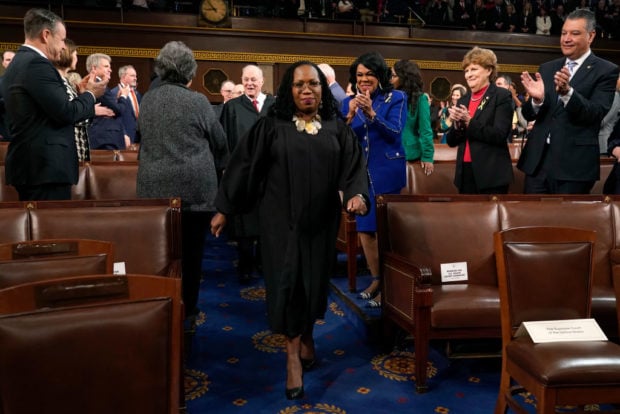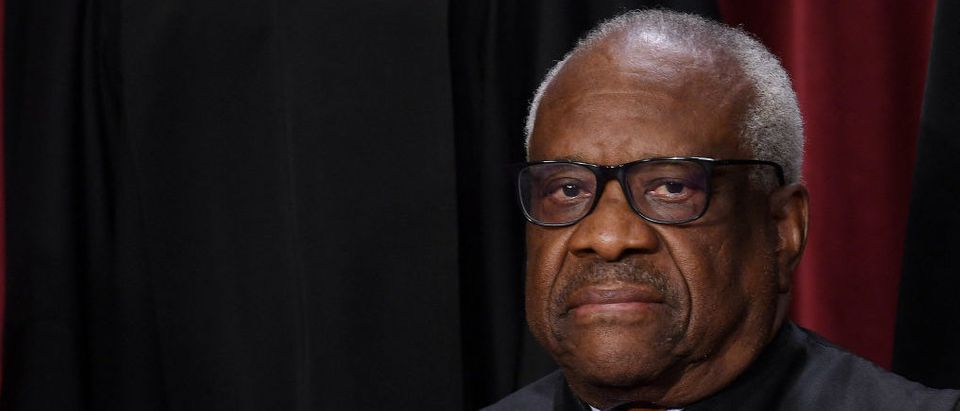Supreme Court Justice Clarence Thomas torched Justice Ketanji Brown Jackson’s dissent from the affirmative action ruling, arguing she does not understand equality or statistics.
The Supreme Court ruled Thursday affirmative action is unconstitutional in two lawsuits brought against Harvard and the University of North Carolina. The cases challenged the universities’ use of racial preferences during the admissions process.
Chief Justice John Roberts wrote the majority opinion and was joined by Justices Clarence Thomas, Samuel Alito, Neil Gorsuch, Brett Kavanaugh and Amy Coney Barrett.
Thomas said Jackson’s argument focusing on statistical disparities is not always “ascribable to race.”
“Justice Jackson uses her broad observations about statistical relationships between race and select measures of health, wealth, and well-being to label all blacks as victims. Her desire to do so is unfathomable to me,” Thomas wrote.
“I cannot deny the great accomplishments of black Americans, including those who succeeded despite long odds.” (RELATED: MSNBC Analyst Says Clarence Thomas Got On The Bench Because Of Affirmative Action)

WASHINGTON, DC – FEBRUARY 07: Supreme Court Justice Ketanji Brown Jackson attends the State of the Union address on February 7, 2023 in the House Chamber of the U.S. Capitol in Washington, DC. The speech marks President Biden’s first address to the new Republican-controlled House. (Photo by Jacquelyn Martin-Pool/Getty Images)
“Nor do Justice Jackson’s statistics regarding a correlation between levels of health, wealth, and well-being between selected racial groups prove anything. Of course, none of those statistics are capable of drawing a direct casual link between race — rather than socioeconomic status or any other factor — and individual outcomes. So Justice Jackson supplies the link herself: the legacy of slavery and the nature of inherited wealth. This, she claims, locks blacks into a seemingly perpetual inferior caste.”
“Such a view is irrational; it is an insult to individual achievement and cancerous to young minds seeking to push through barriers, rather than cosign themselves to permanent victim-hood,” Thomas continued, arguing schools may take into account a student’s financial means or medical struggles.
“What it cannot do is use the applicant’s skin color as a heuristic, assuming that because the applicant checks the box for ‘black’ he therefore conforms to the university’s monolithic and reductionist view of an abstract, average black person.”
Thomas went on to argue individuals are defined by how they overcome barriers and challenges and race is not to be blamed for shortcomings. Thomas warned that Jackson’s suggestion to let “experts” handle affirmative action policies could eventually lead to “outright wealth transfers, quota systems, and racial preferences.”
“Though Justice Jackson seems to think that her race based theory can somehow benefit everyone, it is an immutable fact that ‘every time the government uses racial criteria to ‘bring the races together,’ someone gets excluded, and the person excluded suffers an injury solely because of his or her race.'”
“There is no reason to continue down that path. In the wake of the Civil War, the Framers of the Fourteenth Amendment chartered a way out: a colorblind Constitution that requires the government to, at long last, put aside its citizens’ skin color and focus on their individual achievements.”


